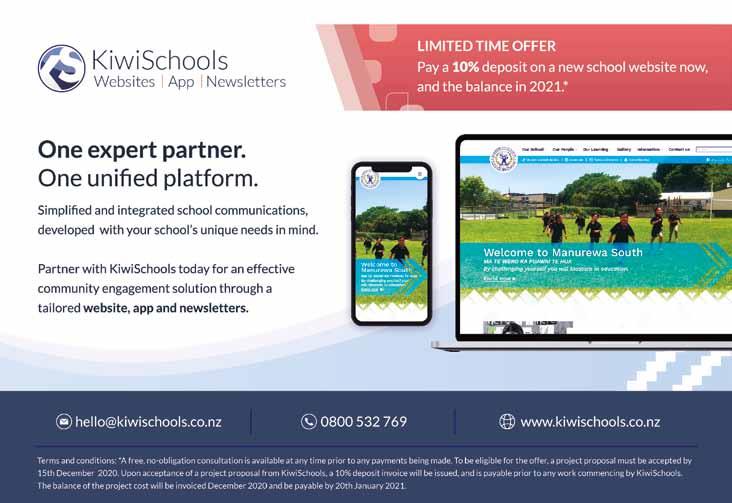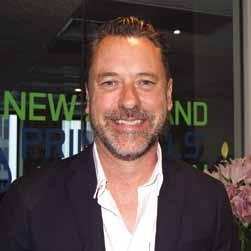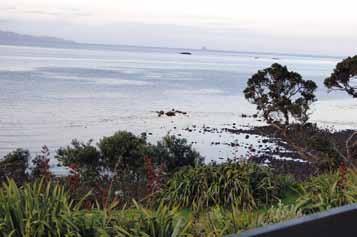
11 minute read
NZPF HISTory 2000–2012
GeoFF LoveGrove, AuTHor oF ‘FIrST Pr the new MIllennIuM’ TALKS wITH LIZ H
Liz Hawes
editor
HIS coLLeAGueS oFTeN describe him as the wise one, the one who has years of experience and who uses knowledge critically. His mentoring skills are legendary, as are his communication and writing skills. Dozens of grateful principals still thank him for helping them to manage their way out of impossible crises. He is gentle, humble and humorous. He is retired school principal, Geoff Lovegrove.
Highly respected for his professionalism, Geoff was repeatedly re-elected to the NZPF national executive from 1989 to 2010. He was president for two years, treasurer for five and editor of this magazine for nine years, signing off his last magazine in June 2010.
It is rare to meet a former school principal who continues to be connected at so many levels of education in the way that Geoff is, nor one who carries as much knowledge and love of its history. Who better to write the sequel to Tom Brown’s ‘First Principals – A history of the New Zealand Principals’ Federation’?
As we settle into a comfortable little café in Geoff’s retirement town of Feilding, I ask him why recording NZPF’s history matters.
‘We do not often record events as they are happening, and then, as time passes, we wonder what happened, and what led to the outcomes that resulted. NZPF is still a relatively young organisation and it is great that our forebears thought to keep good records. Even better, we had people like Tom Brown to access the records, interview key people, and write First Principals, covering those critical early years. Why the word “Federation”? How did we get involved internationally? Those details are important, and we should be delighted that someone had the foresight to document this in formation.’
George Santayana, the renowned philosopher, once said that those who cannot remember the past are condemned to repeat it. It is a quote that has stuck with Geoff, who says, ‘before written word accounts, our forebears depended on oral accounts of history which were passed on through the generations resulting in widely varying versions and interpretations of the same event’. It is vital, he said, that good, accurate evidence is collected, factchecked, agreed and approved for safe keeping. In this way we can learn from the mistakes of the past.
That said, we can’t resolve every issue immediately. The answer, Geoff says, is in persistence. He points to acclaimed educators such as Michael Fullan and Andy Hargreaves who have written extensively about ‘what’s worth fighting for?’ in respect of school leadership. ‘There will always be issues in education,’ he says, ‘and the role of NZPF is to hold fast to its agreed aims and ideals as it seeks to influence policy makers and educational powerbrokers.’ Those aims and ideals are to be the most respected and influential advocate for New Zealand’s school principals and to provide a voice and support for principals as they lead New Zealand schools.
In terms of history, Geoff explains that in the decade before the Tomorrow’s Schools policy was implemented, principals had come to the realization that they needed better support and representation. They were aware that major changes were coming for the administration and governance of schools and wanted a structured professional organization through which principals would support and represent their peers. That was the impetus for establishing NZPF, which would complement the work of the unions.
‘This work will never be completed,’ says Geoff, ‘as the challenges of school leadership will become more complex, and the need for strong advocacy even more critical.’
Over the years NZPF has become stronger and more influential. Geoff lists the main strengths of NZPF as having a history of strong leadership, having highly skilled national executive members and national office staff, being respected by political leaders and their officials, having resilience (Governments come and go but principals endure!), having commitment to a just cause backed by proven educational theory, and having ready access to members.
During his own time as president (1999 and 2000) there were three key issues to confront. These were appropriate PLD for principals, curriculum support and establishing a network of principal advisors.
‘It was inconceivable that school leaders were expected to undertake their complex duties with absolutely no PLD training or support from the Ministry,’ he said. ‘The battle to have this need recognised (and addressed) continued throughout my two years in the hot seat. It was not until a year after my presidency that some major PLD advances were achieved for principals.’
On the subject of curriculum support, Geoff reminisced fondly about the work of curriculum advisors who acted as mentors for principals and provided expert advice on all subjects including reading, mathematics, science, the arts, physical-education and social studies. ‘We looked to extend and improve these services, but instead they were pared back and eventually disappeared,’ he said sadly.
‘We also focused on establishing a network of principal advisors,’ he said. ‘We sought a system-wide allocation of experienced school leaders who could assist with hauora issues that were emerging.’
It would be a long wait for the Principal Leadership Advisory (PLA) to be set up, and not until 2015 was David Hain, the first advisor, appointed in Northland. Today there are 36 PLAs employed by Evaluation Associates across the country but NZPF believes that number should be doubled. Geoff agrees, there is much more work to do yet.
One question Geoff would not be drawn on was whether the
PrINcIPALS – Into HAweS
quality of education is higher now than in earlier days. People value different skills and attributes at different times, he said. Over his 47-year career in education Geoff witnessed many changes. ‘Most were for the better,’ he says confidently. ‘Learning today is certainly more complex and there are so many variables for our young people to deal with. I believe most of them cope exceedingly well. There are many support systems in place, and we can always ask for more, but visit any classroom, chat with any group of young people today, and they are a joy to see at work. They are facing a raft of challenges that our own parents could never anticipate, and in most cases, they are succeeding. I envy and commend them (and their teachers) for the way they go about their work.’
Given the imminent general election, I asked Geoff about political intrusion in education and what might prevent it.
He began his answer with a question. ‘Does the piper call the tune?’ ‘Education,’ he said, ‘is largely paid for by the state, and politicians have an expectation that it will deliver. So long as there are respectful, robust conversations on the issues, the nation should expect that the educators get on with the job of teaching and learning without political intrusion.’
‘Political parties have their policies and their agendas, and when elected, they feel they have the mandate of the people to implement those policies. That is a given. It is when those policies have no foundation in educational thinking that conflict arises. We have seen a perfect example of this in the National Standards debacle that focused us all, throughout the first seventeen years of this century. Despite a raft of academic thinking and international experience, the government went ahead with a global reform philosophy that was flawed from the outset and has caused immeasurable harm,’ he said.
So, what would prevent political intrusion? ‘Hard to say,’ says Geoff, ‘but a concerted, reasoned, wellresourced and clearly thought through anti-national standards campaign, still failed to prevent it happening. The piper called the tune.’
We then turned our attention to NZPF conferences, why we have always held them and how they benefit principals.
‘The earliest NZPF Conferences were held in Auckland and Hamilton,’ says Geoff, ‘reflecting the home-towns of the majority of the initial membership. The 1984 “Conference” (total cost $36.50 per principal) was really an annual meeting with the added attractions of afternoon tea and dinner, followed by a western-themed musical, and Sunday lunch. From those early AGMs grew a tradition of major annual conferences, always with a theme appropriate to the times, and guest speakers sharing the latest thinking on school leadership. Con Coffey (NZPF President 1987-1989) opened doors in Wellington and the 1988 conference was the first of the modern format, with keynote addresses and breakout groups. Tomorrow’s Schools arrived, and the 1989 Conference in Auckland provided the turning point for NZPF, with corporate partners, overseas speakers, and a significant increase in registration numbers. Why is Conference important? It is not just for the speakers and their messages; it is not only for the AGM and finance reporting; not just to elect a new Executive (That has been handled electronically for some years now). It is all these elements, but it is also an annual opportunity for principals (and many deputy principals) to meet colleagues, discuss issues, catch up on stories, and just “chew the fat”. This has always been a very valuable component of every conference.’
Whilst on the topic of conferences, I asked Geoff how international relationships through NZPF’s membership of the International Confederation of Principals (ICP) benefited principals globally. I was surprised to learn how historically influential New Zealand principals had been in establishing the ICP.
‘Our links with overseas colleagues trace back to the Australian conferences of the early nineties,’ he said. ‘We have also had close links with our UK and Irish principal associations for many years. We have learned so much from them, and there is still much we can learn, from their successes and their failures. We were early members of the fledgling ICP and have participated in international education affairs for many years.’
‘It was a privilege,’ he said, ‘to attend several ICP conventions, especially in Edinburgh in 2003, when our own NZPF president, Nola Hambleton, was international President of ICP and chaired the World Convention. What have been our contributions? I can think of three significant ones,’ he said.
‘The first is financial stability. ICP struggled for many years until two events in New Zealand. We hosted an ICP Council
meeting in Auckland in 2005 (at short notice, after Taiwan pulled out). NZPF pulled together several able principals, who not only organized a superb Council Meeting, but also managed to achieve a significant financial profit for ICP. Two years later, Auckland hosted the first ICP Convention to be held in New Zealand, and once again, through some amazing lobbying, corporate negotiating and arm-twisting, achieved a substantial surplus, giving ICP its first sound financial footing.’
‘The second,’ he said, ‘relates to New Zealand’s educational reputation. New Zealand stands tall in international education circles, and over many decades has won a good deal of respect and admiration for the way we work in our schools. The “New Zealand Way” is quite unique, and we continue to host international visitors who want to see what we do.’
The third contribution relates to clear thinking and solutionbased action.
‘We were disappointed, and somewhat bemused by the process adopted by ICP in the early days when formulating discussion position papers,’ said Geoff. ‘There were some serious issues in world education, and ICP was an ideal forum to bring people and nations together to raise educational opportunities for all, but especially for the third world countries. ICP was quite a polite “old boys’ network”, and when Nola Hambleton and I attended a Council meeting in Jerusalem, we were appalled at the way the issues were dealt with. An important paper had been discussed a year before and scheduled for further discussion at this meeting. A couple of people spoke, and then a dignified gentleman moved a resolution, “that the matter be tabled, and discussed again at the next Council meeting!” We had done our homework, and fully expected some action on the very good proposals embedded in the paper. I believe it was that single event that prompted Nola to work so hard to improve the way the ICP operated, and indeed, during her two-year presidency of ICP, several major changes were made to the overall operation and efficiency of the international organization,’ he said.
Having worked as executive officer for NZPF for a decade, I was amazed at how much I didn’t know. With so much historical knowledge of the organization, Geoff was clearly the perfect candidate to pen this next phase of NZPF history. As expected, he has compiled a comprehensive, well written account of NZPF from 2000 – 2012. He has not just recorded the educational events and various policies that emerged across the twelve year timeframe, he has brought the human face and the credible narratives to those events so that we can feel the impact of the policy decisions on individuals and groups of principals. We hear the stories and the impact Government policies have had on school principals during this time.
Geoff has exercised his considerable writing talent to ‘put the flesh on the bones’ to breathe life into the educational events of a decade. It is a wise and compelling narration of principals’ experiences, allowing us to both learn from the past and inform our educational future.
admin@afsl.nz www.afsl.nz 04-909-7729

Talk to the school accounting experts
Your school should be receiving meaningful and timely financial information and advice - this is at the heart of what we do at Accounting For Schools.
If you want more confidence about your School's finances, then contact us today for a no obligation chat and let us help you plan for the future.
COMPLETE FINANCIAL TRANSPARENCY
TIME SAVING PROCESSES
SIMPLIFIED MONTHLY REPORTING
ONGOING EXPERT SUPPORT








